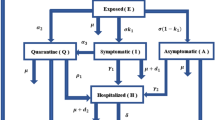Abstract
Chickenpox is one of the most widespread diseases in the world. Since the domestic vaccine has not been developed at present, and the purchase of an imported vaccine for routine vaccination is an expensive investment of the state, there is a need to assess the epidemiological and socio-economic effectiveness of vaccination based on the results of simulation modeling. This article describes the implementation of a simulation model of the spread of chickenpox in the population as a system for managing and strategic planning of vaccination against the Varicella Zoster virus. An algorithm for computer simulation of the spread of chicken pox with the features of various types of vaccination is given. A comparative analysis of the results obtained in the process of constructing the model with real medical data was carried out. The software implementation of the model was carried out in the high-level programming language Python. To determine the parameters of the simulation model, statistical data on the incidence of chickenpox in the Altai Territory for 2008–2018 were used. Such a system of vaccine prevention management allows, without long-term medical examinations and expensive procedures, to identify and, in particular, determine the best strategy for vaccination in a fairly short period of time. As a result of modeling, it was possible to identify the most optimal strategy for vaccination against the varicella-zoster virus in the Altai Territory, build graphs of the dynamics of the spread of the virus, reflecting the number of cases during one of the types of vaccination and without such procedures. It allowed one to evaluate the epidemiological and socio-economic efficiency of vaccination programs against chickenpox for children in the Altai Territory. Thus, computer technologies and computer modeling, a comprehensive computational study of the dynamics of the development of various diseases can help medical workers determine the optimal strategy in the treatment of diseases, as well as predict its consequences.
Access this chapter
Tax calculation will be finalised at checkout
Purchases are for personal use only
Similar content being viewed by others
References
Afonina, N.M., Miheeva, I.V.: Socio-economic significance of infectious pathology caused by the Varicella zoster virus. Materials of the XXI Congress of Pediatricians of Russia with international participation “Topical problems of pediatrics”. Moscow (2019). (in Russian)
Balikin, V.F., Filosofova, M.S.: Expansion of clinical polymorphism and increasing severity of Varicella zoster infection in children. Materials of the XIII Congress of Pediatric Infectious Diseases of Russia “Topical issues of infectious pathology and vaccination”. Moscow (2014). (in Russian)
Streng, A., Grote, V., Rack-Hoch, A., et al.: Decline of neurologic varicella complications in children during the first 7 years after introduction of universal varicella vaccination in Germany, 2005–2011. Pediatr. Infect Dis. J. 36(1), 79–86 (2017)
Zryachkin, N.I., Buchkova, T.N., Chebotareva, G.I.: Complications of varicella (literature review). J. Infectology 9(3), 117–128 (2017). (in Russian)
Chickenpox – MayoClinic Reference. https://www.mayoclinic.org/diseases-conditions/chickenpox/symptoms-causes/syc-2035128
Timchenko, V.N.: Infectious diseases in children. St. Petersburg, SpetsLit, 218–224 (2012). (in Russian)
Zryachkin, N.I., Buchkova, T.N., Elizarova, T.V., Chebotareva, G.I.: Pharmacoeconomical justification for the inclusion of vaccination against chickenpox in the regional calendar of preventive vaccinations on the example of the Penza region. Epidemiol. Infect. Dis. 22(6), 288–294 (2017). (in Russian)
Order of the Ministry of Health of the Russian Federation No. 1122n dated 06.12.2021 “On approval of the national calendar of preventive vaccinations, the calendar of preventive vaccinations for epidemic indications and the procedure for preventive vaccinations” (in Russian)
Peredelskaya, E.A., Safyanova, T.V., Kozlov, D., Kulshin, A.V., Khvorova, L.A.: Epidemiological and socio-economic evaluation of the effectiveness of a single vaccination program against chicken pox for children 6 years old on the example of the Altai Territory. Medicine 4, 66–79 (2021). (in Russian)
Taha, H.A.: Operations Research: An Introduction. Williams, Moscow, 697–737 (2007). (in Russian)
Kermack, W.O., McKendrick, A.G.: A contribution to the mathematical theory of epidemics. Proc. Royal Soc. London Series A, Containing Papers Math. Phys. Charact. 115(772), 700–721 (1927)
Barton, P., Bryan, S., Robinson, S.: Modelling in the economic evaluation of health care: selecting the appropriate approach. J Health Serv Res Policy 9(2), 110–118 (2004)
Briggs, A., Claxton, K., Sculpher, M.: Decision Modelling for Health Economic Evaluation. Oxford University Press, London (2007)
Vander, P.: Python for Complex tasks: Data Science and Machine Learning. Peter, St. Petersburg (2018). (in Russian)
Rashka, S.: Python and Machine Learning: A textbook. DMK Press, Moscow (2017)
Downey, A.B.: Studying Complex Systems Using Python. DMK Press, Moscow (2019)
Downey, A.B.: Modeling and Simulation in Python, Green Tea Press (2017)
Lee, Y.H., Choe, Y.J., Cho, S.I., et al.: Effects of one-dose varicella vaccination on disease severity in children during outbreaks in Seoul Korea. J. Korean Med. Sci. 34(10), e83 (2019)
Perella, D., Wang, C., Civen, R., et al.: Varicella vaccine effectiveness in preventing community transmission in the 2-dose era. Pediatrics 137(4), e20152802 (2016)
Marin, M., Marti, M., Kambhampati, A., et al.: Global varicella vaccine effectiveness: a meta-analysis. Pediatrics 137(3), e20153741 (2016)
Acknowledgments
This work was supported in the framework of “Priority-2030” Program by Altai State University.
Author information
Authors and Affiliations
Corresponding author
Editor information
Editors and Affiliations
Rights and permissions
Copyright information
© 2023 The Author(s), under exclusive license to Springer Nature Switzerland AG
About this paper
Cite this paper
Kulshin, A.V., Kozlov, D.Y., Peredelskaya, E.A., Khvorova, L.A., Safyanova, T.V. (2023). Evaluation of the Efficiency of the Vaccination Against Chickenpox Based on the Results of Simulation Modeling. In: Jordan, V., Tarasov, I., Shurina, E., Filimonov, N., Faerman, V. (eds) High-Performance Computing Systems and Technologies in Scientific Research, Automation of Control and Production. HPCST 2022. Communications in Computer and Information Science, vol 1733. Springer, Cham. https://doi.org/10.1007/978-3-031-23744-7_14
Download citation
DOI: https://doi.org/10.1007/978-3-031-23744-7_14
Published:
Publisher Name: Springer, Cham
Print ISBN: 978-3-031-23743-0
Online ISBN: 978-3-031-23744-7
eBook Packages: Computer ScienceComputer Science (R0)




